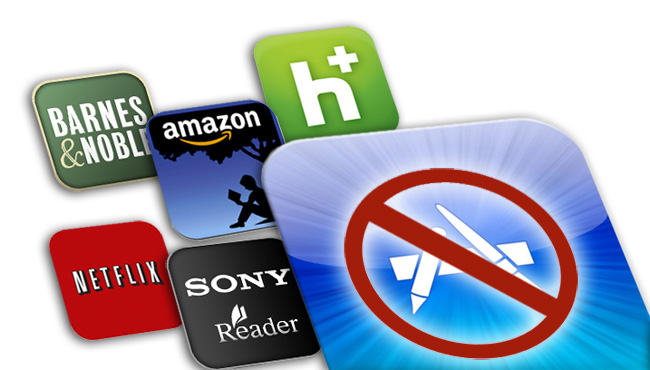
Apple rules over its App Store with an iron fist. It makes its own rules and reserves the right to reject or delay any app for almost any reason. Now, the world’s largest app store is telling major application developers like Sony that they are no longer allowed to sell in-app content or even let customers view content they may have purchased outside of Apple’s App Store. Confused? The implications may be worse than you realize.
Sony’s Reader Store rejected
The NY Times reports that Apple has rejected Sony’s e-book iPhone app, which lets people buy and read e-books on the Sony Reader Store. From now on, Apple told Sony, in-app purchases must go through Apple, presumably so the company gets a cut of profits.
In a statement on its Reader Website, Sony acknowledged the issue: “We would like to update everyone on the status of our Readerfor iPhone mobile application. We created an app that we’re very excited about, which includes all the features you’ve come to expect from a mobile reading application – including access to your existing collection, synching with your Reader Daily Edition and purchasing new content as is possible on other mobile platforms…Unfortunately, with little notice, Apple changed the way it enforces its rules and this will prevent the current version of the Reader for iPhone from being available in the app store. We opened a dialog with Apple to see if we can come up with an equitable resolution but reached an impasse at this time. We’re exploring other avenues to bring the Reader experience to Apple mobile devices. We know that many of you are eagerly awaiting the application and we appreciate your continued patience.”
Sadly, there is no way to get an app on an iOS device without distribution in the App Store. Sony will have to built up a mobile Website to get around Apple’s restrictions.
Are several major apps in danger?

Newspaper and magazine apps may also face difficulties with this policy. If you purchase a subscription to a newspaper outside of Apple’s App Store (a common thing), you may not be allowed to redeem your app without paying to view it again on the iPhone/iPad. Apple may not care either, hoping to drive sales to iOS exclusive newspapers like The Daily.
Video download or streaming apps could also come under scrutiny by Apple if it takes this new policy to the extreme. Movies and TV shows sold through apps would have to go through iTunes in-app purchasing as well. It is unknown if such a conflict would extend to a service like Netflix or Hulu, which offer unlimited streaming of a pool of titles for a monthly fee.
In a networked world increasingly built on cloud computing, syncing, and sharing data, this rule is a step backward in connectivity.
It is news like this that makes me happy I currently own an Android phone. What do you think? Is it right for Apple to assert this level of control? Or is it another situation where, if we don’t like it, we should go someplace else?
Update 1: Added a bit about Netflix and video streaming apps.
Update 2: The WSJ reports official comment from Apple spokesperson Trudy Miller. “We have not changed our developer terms or guidelines,” said Miller. “We are now requiring that if an app offers customers the ability to purchase books outside of the app, that the same option is also available to customers from within the app with in-app purchase.”
This means that Apple is not requiring you to purchase items through Apple, but developers must offer the choice of purchasing through the iTunes in-app purchasing system. It appears that Sony may have misstated the facts a bit. The move is also somewhat confusing as Amazon does not use in-app purchases in its app. Will it be forced to change its app? This appears to be a clever way for Apple to get a 30 percent cut of all in-app purchases.
